必修二 第二单元复习
- 格式:doc
- 大小:29.50 KB
- 文档页数:6
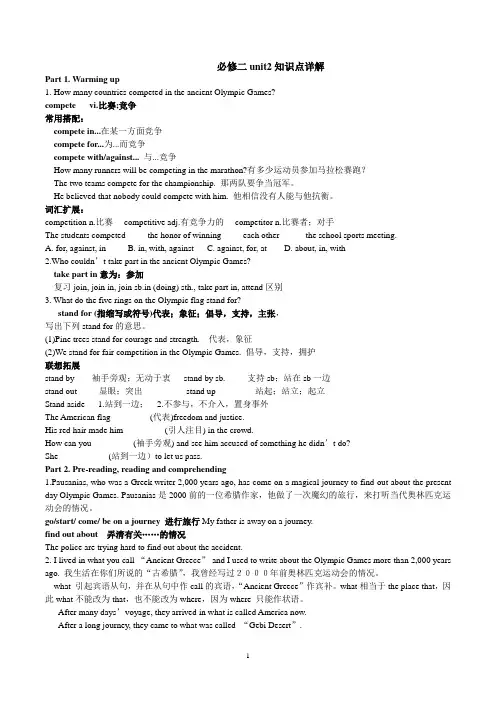
必修二unit2知识点详解Part 1. Warming up1. How many countries competed in the ancient Olympic Games?compete vi.比赛;竞争常用搭配:compete in...在某一方面竞争compete for...为...而竞争compete with/against... 与...竞争How many runners will be competing in the marathon?有多少运动员参加马拉松赛跑?The two teams compete for the championship. 那两队要争当冠军。
He believed that nobody could compete with him. 他相信没有人能与他抗衡。
词汇扩展:competition n.比赛 competitive adj.有竞争力的 competitor n.比赛者;对手The students competed ____ the honor of winning ____ each other _____ the school sports meeting.A. for, against, inB. in, with, againstC. against, for, atD. about, in, with2.Who couldn’t take part in the ancient Olympic Games?take part in意为:参加复习join, join in, join sb.in (doing) sth., take part in, attend区别3. What do the five rings on the Olympic flag stand for?stand for (指缩写或符号)代表;象征;倡导,支持,主张,写出下列stand for的意思。
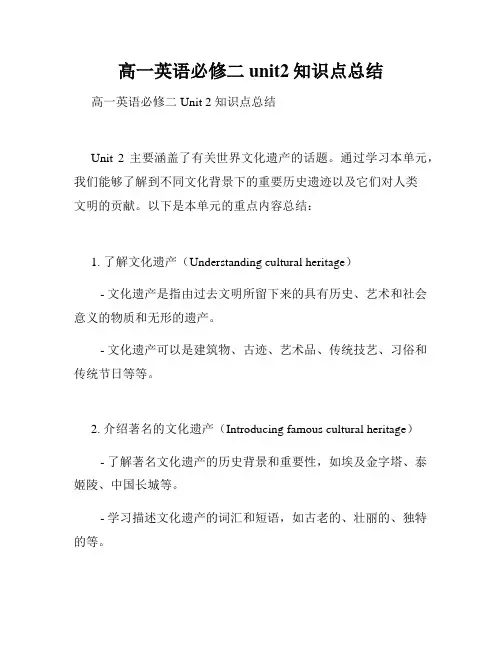
高一英语必修二unit2知识点总结高一英语必修二Unit 2 知识点总结Unit 2主要涵盖了有关世界文化遗产的话题。
通过学习本单元,我们能够了解到不同文化背景下的重要历史遗迹以及它们对人类文明的贡献。
以下是本单元的重点内容总结:1. 了解文化遗产(Understanding cultural heritage)- 文化遗产是指由过去文明所留下来的具有历史、艺术和社会意义的物质和无形的遗产。
- 文化遗产可以是建筑物、古迹、艺术品、传统技艺、习俗和传统节日等等。
2. 介绍著名的文化遗产(Introducing famous cultural heritage)- 了解著名文化遗产的历史背景和重要性,如埃及金字塔、泰姬陵、中国长城等。
- 学习描述文化遗产的词汇和短语,如古老的、壮丽的、独特的等。
3. 学习被动语态(Passive Voice)- 被动语态用于强调动作的接受者,或者说不知道动作的执行者是谁。
- 被动语态的构成:be+过去分词,根据时态和语态的要求进行相应的变换。
4. 阅读技巧(Reading Skills)- 学习如何通过阅读理解文章中的关键信息。
- 注意上下文和词汇的联系,利用上下文猜测词义。
5. 语法重点(Grammar Focus)- 学习并掌握几种非谓语动词形式的用法,如动名词、不定式和分词。
- 注意非谓语动词在句子中的作用和与其他成分的搭配。
6. 扩展阅读(Extensive Reading)- 阅读有关世界文化遗产的文章,拓宽对于世界各地文化的了解。
- 提高阅读理解技巧,增加词汇量。
7. 写作技巧(Writing Skills)- 学习如何写一篇关于世界文化遗产的文章,介绍其历史和重要性。
- 注意文章的结构,包括引言、主体和结论,并适当使用连接词使文章连贯。
以上是关于高一英语必修二Unit 2的知识点的总结。
通过学习这些内容,我们能够更好地了解世界各地的文化遗产以及它们的重要性。
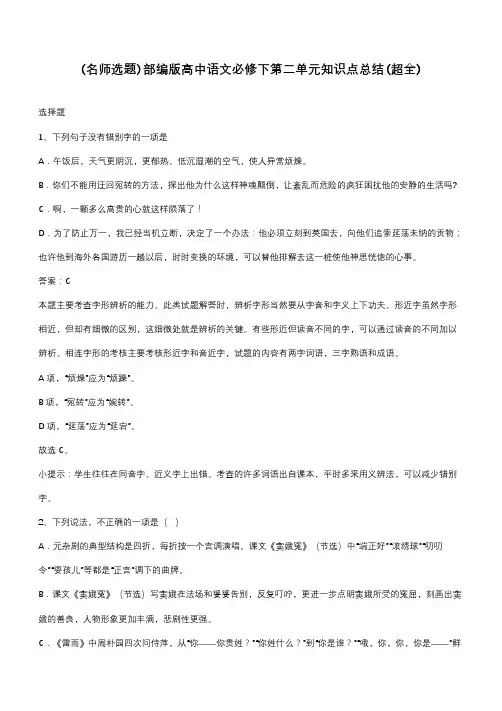
(名师选题)部编版高中语文必修下第二单元知识点总结(超全)选择题1、下列句子没有错别字的一项是A.午饭后,天气更阴沉,更郁热。
低沉湿潮的空气,使人异常烦燥。
B.你们不能用迂回宛转的方法,探出他为什么这样神魂颠倒,让紊乱而危险的疯狂困扰他的安静的生活吗? C.啊,一颗多么高贵的心就这样陨落了!D.为了防止万一,我已经当机立断,决定了一个办法:他必须立刻到英国去,向他们追索延荡未纳的贡物;也许他到海外各国游历一趟以后,时时变换的环境,可以替他排解去这一桩使他神思恍惚的心事。
答案:C本题主要考查字形辨析的能力。
此类试题解答时,辨析字形当然要从字音和字义上下功夫。
形近字虽然字形相近,但却有细微的区别,这细微处就是辨析的关键。
有些形近但读音不同的字,可以通过读音的不同加以辨析。
相连字形的考核主要考核形近字和音近字,试题的内容有两字词语,三字熟语和成语。
A项,“烦燥”应为“烦躁”。
B项,“宛转”应为“婉转”。
D项,“延荡”应为“延宕”。
故选C。
小提示:学生往往在同音字、近义字上出错。
考查的许多词语出自课本,平时多采用义辨法,可以减少错别字。
2、下列说法,不正确的一项是()A.元杂剧的典型结构是四折,每折按一个宫调演唱。
课文《窦娥冤》(节选)中“端正好”“滚绣球”“叨叨令”“耍孩儿”等都是“正宫”调下的曲牌。
B.课文《窦娥冤》(节选)写窦娥在法场和婆婆告别,反复叮咛,更进一步点明窦娥所受的冤屈,刻画出窦娥的善良,人物形象更加丰满,悲剧性更强。
C.《雷雨》中周朴园四次问侍萍,从“你——你贵姓?”“你姓什么?”到“你是谁?”“哦,你,你,你是——”鲜明地显示他内心渐趋紧张。
D.《哈姆莱特》中,英国王子哈姆莱特虽然装疯,但是通过他曾经的妻子奥非莉亚的话,我们依然可以领略哈姆莱特高贵的品质。
答案:D本题考查学生对常见的文化常识的识记掌握能力。
D.“英国王子哈姆莱特虽然装疯”错误,哈姆莱特应该是“丹麦”王子。
故选D。
3、下列有关文学常识的表述,正确的一项是A.元杂剧的四大悲剧是关汉卿的《窦娥冤》、马致远的《汉宫秋》、白朴的《梧桐雨》和郑光祖的《赵氏孤儿》。
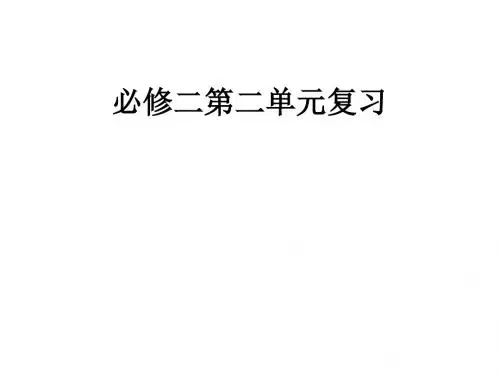
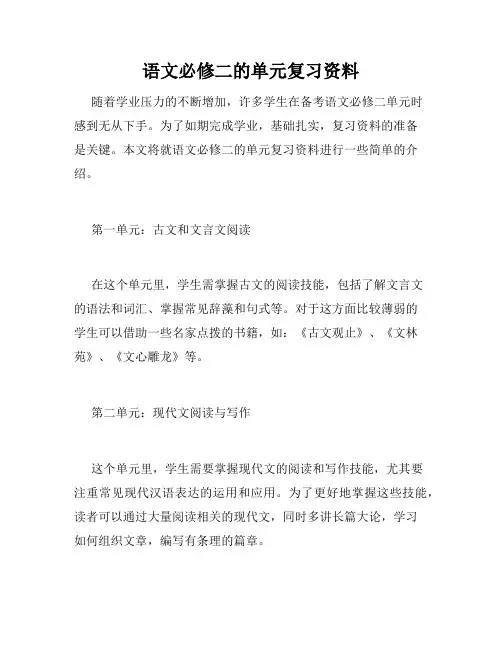
语文必修二的单元复习资料随着学业压力的不断增加,许多学生在备考语文必修二单元时感到无从下手。
为了如期完成学业,基础扎实,复习资料的准备是关键。
本文将就语文必修二的单元复习资料进行一些简单的介绍。
第一单元:古文和文言文阅读在这个单元里,学生需掌握古文的阅读技能,包括了解文言文的语法和词汇、掌握常见辞藻和句式等。
对于这方面比较薄弱的学生可以借助一些名家点拨的书籍,如:《古文观止》、《文林苑》、《文心雕龙》等。
第二单元:现代文阅读与写作这个单元里,学生需要掌握现代文的阅读和写作技能,尤其要注重常见现代汉语表达的运用和应用。
为了更好地掌握这些技能,读者可以通过大量阅读相关的现代文,同时多讲长篇大论,学习如何组织文章,编写有条理的篇章。
第三单元:修辞和应用这个单元的主要内容是围绕修辞学的基础知识展开,学生需要掌握修辞手法的运用等。
此外,还要注意对生活中的明喻,暗喻等修辞手法的应用。
关于修辞学的学习,可以选择一些入门级的书籍来阅读,例如《修辞学》、《修辞之道》等。
第四单元:古诗文阅读古诗文是中国优秀文化遗产之一,这个单元的学习重在掌握古诗文的艺术特征和阅读技能。
学习过程中建议选择教材上的课文,并结合古诗文的诗歌韵律和构思风格来进行深入阅读。
为了更好地掌握古诗文,还需在平时多背诵一些名家作品,例如《唐诗三百首》等。
第五单元:现代文学阅读与鉴赏这个单元的主要内容是讲述现代文学发展的历史和现代文学的基本要素,以及如何欣赏一篇好的现代文学作品。
学生可以选择一些优秀文学作品来阅读,如鲁迅的《朝花夕拾》、郭沫若的《太阳照在桑干河上》等,以此进行鉴赏和分析。
以上内容就是我所列举的语文必修二的单元复习资料。
当然,为了更好地掌握这些知识,还需要学生在平时多注重课堂学习和阅读实践,并对所学知识进行总结和回顾。
最后提醒读者,复习并非一件一蹴而就的事情,而是需要耐心和努力的。
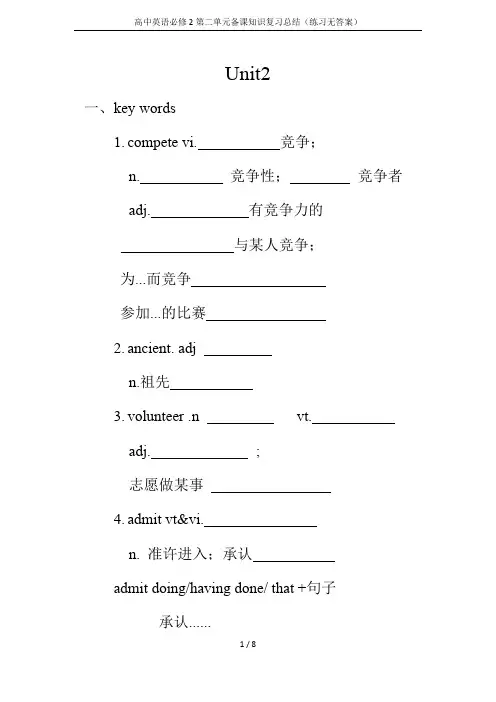
Unit2一、key wordspete vi. 竞争;n. 竞争性;竞争者adj. 有竞争力的与某人竞争;为...而竞争参加...的比赛2.ancient. adjn.祖先3.volunteer .n vt.adj. ;志愿做某事4.admit vt&vi.n. 准许进入;承认admit doing/having done/ that +句子承认......admit sb./sth . to be承认某人/某物...是...admit sb.to/into...准许进入;准许入学admit... as... 接纳...作为..5.host vt. n.6.replace vt.replace =( take the place of )sb/sth取代某人/某物replace sth.with/by sth.用某物替代某物in place of = in one’s place 代替take one’s place = take the place of 代替7.charge vt. n.in chargein/under the charge ofcharge sb.with (doing) sth 控告某人(做)某事charge sb.for sth 为某物向某人收取费用8.bargain n. vi.bargain with sb. over/about sth.就某事和某人讨价还价make a bargain with sb 与某人达成协议a real bargain9.deserve vi&vt adj.deserve consideration/ attention值得考虑/注意deserve to do 应该/受...deserve to be done = deserve doing应该/值得...10.advertise vt&viadvertise for sb./sth发布广告n.①②二、Phrases:1. stand forstand outstand by2.t ake part in3.P ick up4.a s wellmay/might as wellas well as三、Key structures1.强调句型it is/was...that/who...2.nor/neither...在句首,句子半倒装拓展:so+主语+be/助动词/情态动词so + be/助动词/情态动词+ 主语nor/neither + 主语+be/助动词/情态动词3.the + 比较级,the + 比较级比较级and 比较级4.每隔...every + 基数词+ 复数名词every + 序数词+ 单数名词every + other + 单数名词ed to dobe used to dobe used to doing四、真题微练(2019•新课标Ⅲ)The small town of Rjukan in Norway is situated between several mountains and does not get direct sunlight from late September to mid﹣March﹣ 1 six months out of the year."Of course,we 2 it when the sun is shining," says Karin Ro,who works for the town's tourism office."We see the sky is 3 ,but down in the valley it's darker﹣it's like on a 4 day."But that 5 when a system of high﹣tech 6 was introduced to reflect sunlight from neighboring peaks(山峰)into the valley below.Wednesday,residents(居民)of Rjukan7 their very first ray of winter sunshine:A row of reflective boards on a nearby mountainside were put to8 .The mirrors are controlled by a computer that9them to turn along with the sun throughout the 10 and to close during windy weather.They reflect a concentrated beam (束)of light onto the town's central11 ,creating an area of sunlight roughly 600 square meters.When the light 12 ,Rjukan residents gathered together."People have been13 there and standing there and taking 14 of each other," Ro says."The town square was totally15 .I think almost all the people in the town were there."The 3,500 residents cannot all 16 the sunshine at the same time.17 ,the new light feels like more than enough for the town's 18 residents."It's not very19 ," she says,"but it is enough when we are20 ."1.A.only B.obviously C.nearly D.precisely2.A.fear B.believe C.hear D.notice3.A.empty B.blue C.high D.wide4.A.cloudy B.normal C.different D.warm5.A.helped B.changed C.happened D.matteredputers B.telescopes C.mirrors D.cameras7.A.remembered B.forecasted C.received D.imagined8.A.repair B.risk C.rest D.use9.A.forbids B.directs C.predicts D.follows10.A.day B.Night C.month D.year11.A.library B.hall C.square D.street12.A.appeared B.returned C.faded D.stopped13.A.driving B.hiding C.camping D.sitting14.A.pictures B.notes C.care D.hold15.A.new B.full C.flat D.silent16.A.block B.avoid C.enjoy D.store17.A.Instead B.However C.Gradually D.Similarly18. A. nature﹣loving B. energy﹣savingC. weather﹣beatenD.sun﹣starved19.A.big B.clear C.cold D.easy20.A.trying B.waiting C.watching D.sharing五、小疑小进六、话题积累。

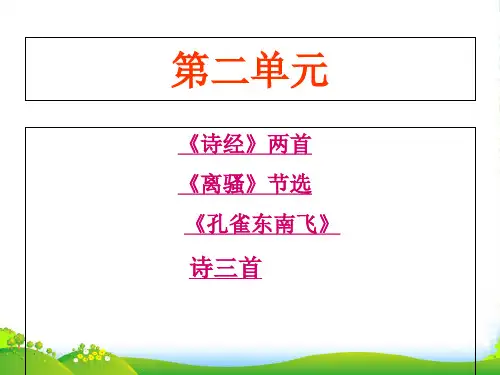
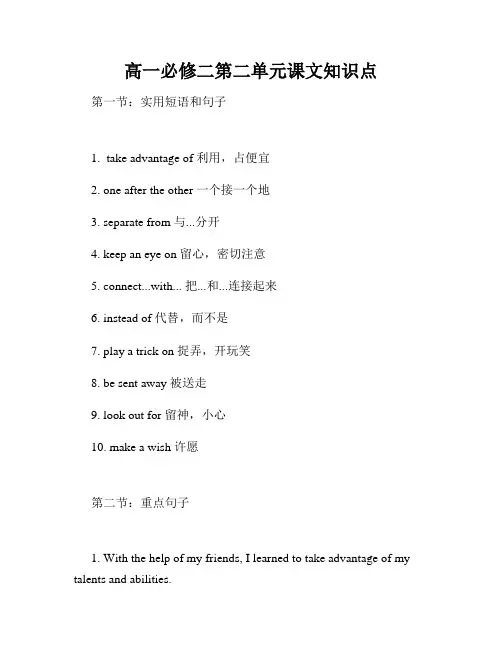
高一必修二第二单元课文知识点第一节:实用短语和句子1. take advantage of 利用,占便宜2. one after the other 一个接一个地3. separate from 与...分开4. keep an eye on 留心,密切注意5. connect...with... 把...和...连接起来6. instead of 代替,而不是7. play a trick on 捉弄,开玩笑8. be sent away 被送走9. look out for 留神,小心10. make a wish 许愿第二节:重点句子1. With the help of my friends, I learned to take advantage of my talents and abilities.2. They taught me to keep an eye on the news and to read useful books.3. I decided to separate myself from others who seemed to always be gossiping or getting into trouble.4. Instead of using my weekends to watch TV or play video games,I started to volunteer at a local community center.5. The experience taught me to connect with others in a meaningful way and to cherish the time we have together.6. When I was feeling down, my friends would play tricks on me to cheer me up.7. I was sent away for summer camp, where I made new friends and learned new skills.8. Remember to look out for opportunities to help others and makea difference in someone's life.9. Whenever my friends and I go stargazing, we make a wish on a shooting star.第三节:重点内容讲解本单元的课文主要讲述了如何发挥自己的天赋和能力,以及与他人建立良好关系的重要性。
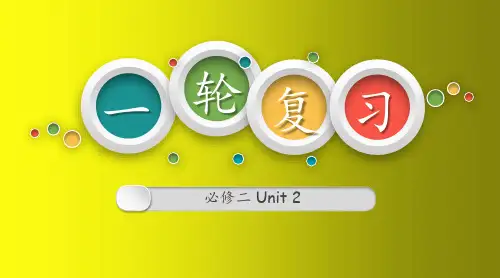
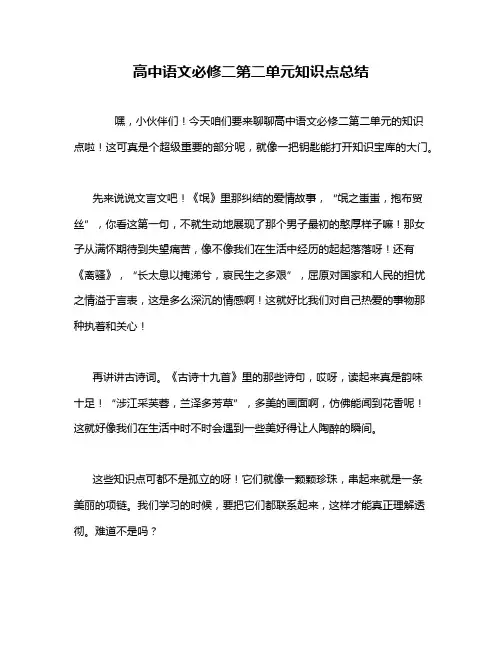
高中语文必修二第二单元知识点总结
嘿,小伙伴们!今天咱们要来聊聊高中语文必修二第二单元的知识点啦!这可真是个超级重要的部分呢,就像一把钥匙能打开知识宝库的大门。
先来说说文言文吧!《氓》里那纠结的爱情故事,“氓之蚩蚩,抱布贸丝”,你看这第一句,不就生动地展现了那个男子最初的憨厚样子嘛!那女子从满怀期待到失望痛苦,像不像我们在生活中经历的起起落落呀!还有《离骚》,“长太息以掩涕兮,哀民生之多艰”,屈原对国家和人民的担忧之情溢于言表,这是多么深沉的情感啊!这就好比我们对自己热爱的事物那种执着和关心!
再讲讲古诗词。
《古诗十九首》里的那些诗句,哎呀,读起来真是韵味十足!“涉江采芙蓉,兰泽多芳草”,多美的画面啊,仿佛能闻到花香呢!这就好像我们在生活中时不时会遇到一些美好得让人陶醉的瞬间。
这些知识点可都不是孤立的呀!它们就像一颗颗珍珠,串起来就是一条美丽的项链。
我们学习的时候,要把它们都联系起来,这样才能真正理解透彻。
难道不是吗?
然后呢,我们要多读多背,就像练功要不断积累一样。
当你能熟练地背诵出那些经典篇章,那种成就感简直无与伦比!
总之,这个单元的知识点非常重要,我们可得好好掌握呀!加油吧,小伙伴们!让我们在语文的海洋里畅游,去探索更多的精彩!。
高三英语必修二unit2知识点高三英语必修二Unit 2 知识点回顾高中英语教材中的第二单元是学生们在高三阶段学习的一部分,本单元主要讲授了关于人与自然的话题。
通过学习这一单元,学生们能够了解到人与自然的关系以及环保问题等方面的知识。
下面将对该单元的重点知识进行回顾。
1. 词汇掌握在这一单元中,学生们要学习和掌握一些与环境和自然相关的词汇。
比如,pollution(污染),deforestation(森林砍伐),extinction(灭绝),ecosystem(生态系统)等。
2. 短语运用学生们也需要掌握一些与环保和保护自然相关的短语。
比如,protect the environment(保护环境),reduce pollution(减少污染),save energy(节约能源),raise awareness(提高意识)等。
3. 语法知识在这一单元中,学生们还需要掌握一些与语法相关的知识。
比如,被动语态的用法。
被动语态在表达自然现象和环境问题时经常被使用。
学生们需要了解被动语态在不同时态中的变化及其运用。
4. 阅读理解这一单元还包括了一篇关于动物保护的阅读理解。
通过阅读这篇文章,学生们能够了解到环境保护对于动物的重要性,并且进一步培养他们的阅读理解能力。
除了以上重点知识点外,还有一些补充内容和拓展知识值得学生们注意和学习。
1. 文化拓展学生们可以通过扩展学习一些与环境保护和自然相关的文化知识。
比如,学习世界上的自然保护区、濒危动物以及各国的环保政策等。
通过学习这一部分,学生们能够了解到不同国家对于环保的重视程度以及不同文化对待自然的态度。
2. 话题讨论可以设置一些与环境保护相关的话题,鼓励学生们进行讨论,并表达自己的观点和想法。
比如,讨论如何减少塑料污染、如何节约能源以及如何对待动物等。
这样可以激发学生们的思考和创作能力,同时也能不断拓宽他们的知识面。
总而言之,高三英语必修二Unit 2主要围绕着人与自然的关系进行学习,通过学习这一单元,学生们能够了解到人类对于环境的影响以及保护自然的重要性。
(名师选题)部编版高中语文必修下第二单元全部重要知识点选择题1、下列各句中,没有语病的一句是()A.中国财政吃紧的压力正节节攀升,在应对庞大的地方政府债务压力的同时,老龄化加重了中国财政不堪负担,社保制度改革迫在眉睫。
B.当前,中国扶贫脱贫已进入由传统模式向新模式转化的攻坚克难,“灌水式”“输血式”等传统方法难以为继,“精准扶贫”成为新阶段的新举措。
C.全面推行河长制的目的是贯彻新发展理念,以保护水资源、防治水污染为主要任务,从而将这一河流生态环境管理的重要制度引入公众视野。
D.健康中国需要社区参与,社区卫生工作者所起到的一个独特的作用就是在走遍千家万户的过程中,向居民传递预防疾病的健康知识和防治服务。
答案:C本题考查病句的辨析和修改。
首先要了解病句的六大类型错误:语序不当、搭配不当、成分残缺、成分赘余、结构混乱、表意不明、不合逻辑。
A项,结构混乱,“老龄化加重了中国财政不堪负担”句式杂糅,可改为“老龄化加重了中国财政负担”。
B项,成分残缺,应在“攻坚克难”后加上“的重要阶段”。
D项,搭配不当,“传递”和“服务”不搭配,最后一个分句应改为“向居民传递预防疾病的健康知识,提供防治服务”。
故选C。
小提示:考查语病,先抓典型的语病标志,比如两面词、判断词、并列动词;然后压缩句子,保留主干,看是否残缺、是否搭配。
要认真细致审读每个选项,重点注意分析并列短语作句子成分与其他成分的搭配,可以将并列短语拆开逐一与其他成分搭配,验证其当否。
对于句式杂糅的句子,先凭语感判定其不协调,再分别造成句子,再放回原文中,验证其当否。
对于语序不当的句子,也要凭语感检测,再将不协调的词语或句子调换位置,看是否通畅自然。
对因不明词义而造成前后矛盾的语句,应尽力推敲出这个关键词语的含义,推敲方法是拆字组词。
2、下列破折号的作用解说有误的一项是()A.周朴园:我看你的性情好像没有大改,——鲁贵像是个很不老实的人。
(表示解释说明)B.鲁侍萍:(泪满眼)我——我——我只要见见我的萍儿。
Book2 Unit 2 The Olympic Games一、重点词汇总结1.ancientadj.古代的in ancient times 在古代;古老的;年代久远的We were deeply attracted by the ancient buildings.pete vi. 竞争,对抗,compete in 参加……的比赛compete with/against 与……比赛/竞争compete for 为争取/得到……而比赛/竞争competition n.比赛;竞争,competitor n.比赛者;竞争者,competitive adj.竞争的;有竞争力的3. take part in 参加4.medal 奖牌/章 a gold/silver/bronze medal 金/银/铜牌5.stand for 是……的意思,代表(不用于进行时);容忍,忍受(用于否定句中);支持,主张6.volunteer:n. 义务工作者,志愿者;v. 自愿做;义务做;无偿做,搭配:volunteer to do sth 自愿做某事7.regular:adj. 规则的;有规律的;定时的,regularly adv. 有规律地;定期地irregular adj. 不规则的on a regular basis 定期8.basis n. 基础,根据on the basis of... 根据,在......的基础上be based on 基于,以.....为基础9.admit (admitted, admitted):允许(人或物)进入,be admitted as “作为…被接受”be admitted to/into “让…进入”(school…)admit doing sth. 承认做某事admit sb. to do sth. 允许某人做某事admit sth.承认某事admit sth./sb. to be 承认某人或某事是……10.may/might as well do sth. =had better do sth.最好做某事;做……倒也无妨10.as well 也,又,还11.host :vt. 做东,主办;n. 主人,东道主12.responsibility:n.责任,负责,responsible adj. 有责任的,有义务的;可信赖的take responsibility for...=be responsible for... 对……负责任a sense of responsibility 责任感,13.replace vt.代替,取代,replace sth/sb 取代某物/某人,replace sth/sb with/by 以……代替某物/某人;替换;rep lace sb/sth = take the place of sb/sth = take sb’s /sth’s place 取代,替代14.charge vt. 收费,要价,charge sb/sth for sth 因……而向某人收费, charge sb sth for sth 因……而向某人收……费;vt. 指控,控告;起诉;指责;charge sb with sth 指控某人某事;charge sb with doing sth 指控某人做了事; n. 要价,收费,charge for st h ……的收费,free of charge 免费;n. 主管,掌管,责任take charge of 负责,掌管,in charge of 主管,掌管, in the charge of 被掌管What did they charge for the repairs?He was charged with murder.Delivery is free of charge.He took charge of the farm after his father’s death.15.fine vt. 罚款,处某人以罚金,fine sb for sth 因……而罚某人的款;n. 罚金,罚款;adj. 可接受的,满意的He was fined for speeding.She has already paid over ﹩2000 in fine.I’ll leave this here, ok? Fine.16.advertise vt. 为……做广告;登广告,advertise sth 登广告宣传某物,advertise for sb/sth 为征求……登广告; advertisement = ad 广告; advertising n. 广告,广告业They advertise their new product on TV.The company is advertising for typists in the newspapers.17.bargain v. 讨价还价,商讨条件,bargain with sb over/about/for sth就某物与某人讨价还价;n.便宜货;n. 协议;交易:make a bargain with sb about sth 与某人就某事/物达成协议He was bargaining with the shop owner over the price.The car was a bargain at that price.18. one after another 一个接一个地;依次地Strange things happened one after another.19. deserve v. (不用于进行时态)值得,应得,应受You deserve a rest after all that hard work.What have I done to deserve this?注意:deserve后接doing或动名词的主动形式表示被动意义,等于接不定式的被动语态。
有此用法的词还有need, want, require等。
They deserved rewarding. = They deserved to be rewarded.The TV needs mending. = The TV needs to be mended.20.take part in 参加;attend a meeting:参加会议;join the army:参军;join sb. in sth:和某人一起干……二、重点句型1.No other countries could join in, nor could slaves or women!别的国家不能参加,奴隶和妇女也不能参加。
归纳:nor+助动词(系动词/情态动词等)+主语neither+助动词(系动词/情态动词等)+主语so+助动词(系动词/情态动词等)+主语so+主语+谓语“确实如此”2.That’s why they’re called the Wint er Olympics.Why引导表语从句,that’s why you can’t stay here.That’s why I asked you to come in.3.It’s in the Summer Olympics that you have the running race, together with swimming, sailing and all the team sports.该句是it is/was…that…强调句型,强调的是介词短语in the Summer Olympics;例如:It is this man that is teaching our English.三、重点语法1. 一般将来时的被动语态;表示从现在看来将要被动发生的动作。
形式有:will+be+done; am/is are+going to be done; am/ is/ are+ to be done 牢记规则:只有及物动词才有被动语态,不及物动词加介词也可构成被动语态,宾语变成了主语,主语是动作的承受者;Tom wrote the letter.变为The letter was written by Tom.2.为何使用被动语态?1)不知道动作的发出者是谁:His bike was stolen.2)没有必要说出动作的发出者:Three teaching buildings were built in our school last year.3)强调动作的承受者:The book was written by Lu Xun.4)短语动词的被动语态:The children are taken good care of.3)被动语态的时态:一般将来时(will be done):4)(1)肯定句:They will be invited to the party.(2)否定句:MR. Sweet’s role will not be replaced in London.(3)一般疑问句:Will more middle school graduates be admitted into university?(4)特殊疑问句:When will the products be advertised in the newspaper?(5)反意疑问句:The next Olympic Games wil l be hosted in London, won’t it?。